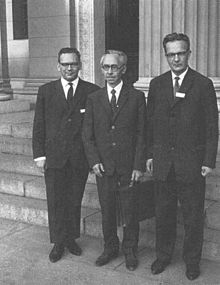August Annist
August annist (until 1936 August Anni * January 16 jul. / 28. January 1899 greg. In Võisiku ; † 6. April 1972 in Tallinn ) was an Estonian literary critic , translator , folklorist and poet .
Life
August Annist attended the primary school in Leie-Litsalu (today part of Kolga-Jaani , Viljandi district ) and the parish school in Kolga-Jaani. He took part in the Estonian War of Freedom (1918–1920) against Soviet Russia . From 1918 to 1923 he studied at the University of Tartu . He spent the years from 1924 to 1927 on a scholarship at the Universities of Helsinki , Bonn and Paris .
From 1929 to 1945 August Annist was a lecturer at the University of Tartu. In 1934 he received his doctorate with a thesis on the Estonian national epic Kalevipoeg . From 1931 to 1940 Annist was responsible for the popular science book series Elav Teadus ("Living Science").
Tragically, many of Annist's manuscripts were destroyed during World War II . In 1942 a report appeared in Finland under the pseudonym Jaan Siiras on the crimes of the Soviet occupation of Estonia under the title Viro neuvostokurimuksessa . The author's true identity was not revealed until the 1980s.
With the Soviet occupation, Annist was arrested in 1945 and imprisoned in Valga and Harku . He was only released in 1951. In the 1950s he worked as a freelance translator and literary scholar. From 1958 to 1971 Annist was employed at the Institute for Language and Literature of the Academy of Sciences of the Estonian SSR .
As a literary scholar, Annist has mainly dealt with the Estonian literature of the 19th century. In addition, the Estonian folk poetry and the Estonian national epic Kalevipoeg were the focus of his interest. Annist translated the Finnish epics Kanteletar (1930/31) and Kalevala (1939 and 1959) as well as Homer's Iliad (1960) and Odyssey (1963) into Estonian . His translations of Old Russian bylins were also important . In addition, Annist himself wrote poems that he based on old Estonian roundabouts.
Works
The most famous work by August Annist is his three-volume standard work on the Estonian national epic Kalevipoeg , which was published under the title Fr. R. Kreutzwaldi "Kalevipoeg" :
- 1. Volume: Kalevipoeg eesti rahvaluules (1935)
- Volume 2: "Kalevipoja" saamislugu (1936)
- Volume 3: "Kalevipoeg" kui kunstiteos (1944)
August Annist published three major poetry works:
- Lauluema Mari (1966)
- Karske Pirita, Maheda Mareta ja mehetapja Maie lood (1970)
- Udres Kudres, Päeva poeg (1990)
Private life
August Annist was married to the historian Linda Annist. The couple had three daughters.
literature
- Ülo Tedre: “Sada aastat August Annistit”. In: Keel ja Kirjandus (1999) No. 1, p. 15.
Web links
- Literature by and about August Annist in the catalog of the German National Library
- CV, pictures, texts (Estonian)
Individual evidence
- ↑ Eesti elulood. Tallinn: Eesti Entsüklopeediakirjastus 2000 (= Eesti entsüklopeedia 14) ISBN 9985-70-064-3 , p. 21
| personal data | |
|---|---|
| SURNAME | Annist, August |
| ALTERNATIVE NAMES | Anni, August; Siiras, Jaan |
| BRIEF DESCRIPTION | Estonian writer |
| DATE OF BIRTH | January 28, 1899 |
| PLACE OF BIRTH | Võisiku |
| DATE OF DEATH | April 6, 1972 |
| Place of death | Tallinn |
